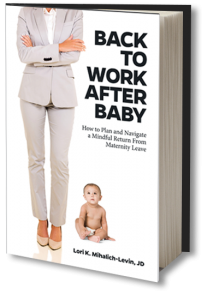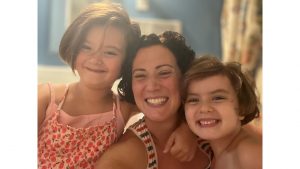 For many new mothers, the postpartum period (even up to 2 years after the birth of a child!) is time filled with a wide range of emotions. And for some, postpartum is also filled with both diagnosed and undiagnosed mental health challenges. I am certain, in retrospect, that I suffered from undiagnosed postpartum anxiety. It left me incredibly fearful and often in tears about how I would manage life with two young children, after my second son was born.
For many new mothers, the postpartum period (even up to 2 years after the birth of a child!) is time filled with a wide range of emotions. And for some, postpartum is also filled with both diagnosed and undiagnosed mental health challenges. I am certain, in retrospect, that I suffered from undiagnosed postpartum anxiety. It left me incredibly fearful and often in tears about how I would manage life with two young children, after my second son was born.
Were it not for the dark place I was in at the time, Mindful Return likely wouldn’t exist. As part of my own healing, I sought to create resources for other new working parents. And I don’t regret going on this now 8+-year long journey. But I didn’t know about Postpartum Support International (PSI) at the time. Had I known, I suspect my own postpartum journey would have been a smoother one.
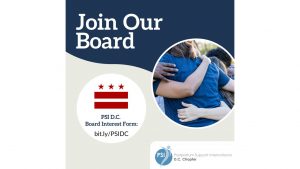 As I set intentions for 2023 around my own service and volunteer work, postpartum advocacy is one of the areas I am re-committing my energy and time to. For example, Postpartum Support International is looking to launch a D.C. Chapter to amplify already-existing perinatal mental health initiatives across the District and to spread the word about perinatal mental health writ large. And I intend to give time to their efforts. (Want to join us for an informational meeting on Wednesday, January 18 from 7-8pm Eastern to learn more about getting involved? To get a calendar invitation for the Jan. 18 meeting, simply complete this really short interest form. You don’t have to live in DC to be part of the Chapter, you just need to have an interest in supporting D.C. residents.)
As I set intentions for 2023 around my own service and volunteer work, postpartum advocacy is one of the areas I am re-committing my energy and time to. For example, Postpartum Support International is looking to launch a D.C. Chapter to amplify already-existing perinatal mental health initiatives across the District and to spread the word about perinatal mental health writ large. And I intend to give time to their efforts. (Want to join us for an informational meeting on Wednesday, January 18 from 7-8pm Eastern to learn more about getting involved? To get a calendar invitation for the Jan. 18 meeting, simply complete this really short interest form. You don’t have to live in DC to be part of the Chapter, you just need to have an interest in supporting D.C. residents.)
Today, I’m inviting to the Mindful Return blog an amazing mama of two, Mikah Berg, to share more about PSI’s resources. In addition to being a dear friend, Mikah is Perinatal Mood and Anxiety Disorder (PMAD) survivor, and she now serves as PSI’s Chapters Program Coordinator. Here is Mikah’s story and some amazing resources you should be familiar with.
Whether you’re a new parent or have new parents in your lives, these supports are both life-affirming and life-saving.
Mindful Return: Mikah! You are an amazing mama of two girls. Please tell us a little bit about yourself and your family.
Lori, thank you so much for interviewing me! I am indeed a mama to two amazing, courageous, curious, and precocious girls. They recently turned 7 and 5. I love being a mom, with all its ups and downs. And I feel immensely privileged to be sharing this ride along with my best friend and partner, Alex.
Mindful Return: Your own personal experience led you to get involved in supporting new parents. Can you tell us more about your own birth and postpartum stories?
I had particularly complicated and unpleasant perinatal periods with each of my girls. Leading up to my first pregnancy, I dealt with infertility. It took nearly a year, and required assistance from a fertility clinic, to become pregnant. Added to that mix, having been diagnosed with bipolar disorder when I was a teenager, I needed to carefully plan with my maternal mental health psychiatrist about what medications were safe for me to take at each stage of the arduous process. (I.e., while attempting to get pregnant, during pregnancy, and postpartum.)
After the initial gratitude for becoming pregnant subsided, I was very anxious throughout my first pregnancy and postpartum. It also was a physically demanding pregnancy. I was uncomfortable and sick for most of it. (“Morning sickness” is certainly something of a misnomer!)
I ended up having an unplanned C-section, and recovering from that was not fun. I also dealt with significant guilt around the tension between feeling so desperate to become pregnant, on one hand, and hating the day-to-day side effects of being pregnant, on the other. After our first daughter was born, most of the turmoil I had felt during the pregnancy gave way to general feelings of joy, and a sense that it had been worth it to bring this new being to life. Still, my anxiety did not abate until many months after the birth.
When Alex and I contemplated having more children (as we had previously discussed), the thought of again having to go through the fertility clinic and pregnancy seemed unappealing, to say the least. Though I was not emotionally or physically ready to start the process over again, I unexpectedly got pregnant with our second daughter when our first was about 17 months old. As the saying goes, “Man plans; God laughs.”
I quickly learned, unfortunately, that it was actually possible to experience a pregnancy even more uncomfortable and complicated than my first pregnancy. The fact that I was incredibly depressed from the get-go only served to compound things. And my feelings around the pregnancy did not improve over time. Due to many complications, not the least of which was my mental health, my medical team decided that a planned C-section was the way to go.
Thankfully, our second daughter was also born beautiful and healthy. When she was handed to me, however, I felt numb and disconnected from her. The voice in my head that had happily proclaimed, “This was worth it!” the first time around was nowhere to be found this time.
I was very fortunate that I had an excellent medical team supporting me, and that Alex and I had been educated about Perinatal Mood and Anxiety Disorders (PMADs) prior to having children. We knew that I was at higher risk for PMADs due to having bipolar disorder. (Anyone with previous mental health struggles, including but not limited to depression, anxiety, mania, and family history of mental health issues, is at higher risk for developing a PMAD.) With the benefit of foresight, however, I had a plan in place in case of emergencies. And those resources were invaluable in helping me navigate a situation that was very challenging, to say the least.
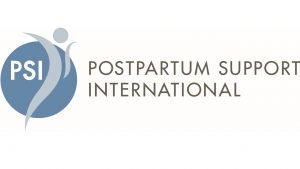
Mindful Return: How did you discover Postpartum Support International (PSI) initially, and how did the organization support you on your own journey?
When I got home from the hospital with our second daughter, I was in a very dark place. My whole being felt tired and emotionally numb. And I was having severe intrusive thoughts. Every day I woke up and wished that I hadn’t. The entire day felt like walking through wet cement, and there was no joy.
Because I already had a psychiatrist and therapist in place as support, my mom made a suggestion to seek out a peer support group to have some people to talk to. After some Googling, she found a peer-led PMAD support group that met twice a month at Holy Cross Hospital in Maryland. My psychiatrist called the group facilitator to ensure she was sufficiently qualified to be helpful for my needs. I did not know it at the time, but both of the facilitators (who were excellent!) were trained through Postpartum Support International (PSI). I appreciated the fact that they had each had their own perinatal mental health struggles. Also one, like me, had difficulty bonding with one of her babies.
Shortly after my first daughter was born, I found and met up with a neighborhood moms group. We chatted about feedings, naptime, going back to work, finding daycares or nannies, and other topics. We all brought our babies with us to the meetings. The entire experience was highly cathartic and extremely helpful for me at that time in my life. Nevertheless, after our second daughter was born, and given that I was feeling really disconnected from her, I decided, with the support of my medical team, that going to that type of group would be detrimental to my already deteriorating mental health at the time. Put simply, I needed something different.
The PMAD support group shared some of the same characteristics as the moms group, in that it was a warm and welcoming environment. In addition, I found the PMAD group to be an especially safe and brave space for me to share how I was really feeling. In that group, I had the ability to share, without judgment, that I was having a very difficult time bonding with my baby, suffering from unabating intrusive thoughts, and felt like the world’s worst mom and person.
I remember I was so nervous the first time I attended that I began crying. Emblematic of the support they provided, however, the group facilitators had tissues on hand. As months went by, I came to be able to laugh regularly at meetings, too. While people attend for different reasons, it felt wonderful to have a place to unburden myself from the recurring negative feelings and thoughts. All while having the peace of mind that others in the community would look at and hear me with supportive and knowing eyes and ears.
In my experience, becoming a parent with a new baby can often be an intrinsically isolating time. Becoming a new parent while also experiencing mental health challenges (whether recurring or new), however, can feel not just isolating, but unbearable. What a gift to find a place where I knew I wasn’t alone. And that I had a group of people going through similar experiences! That group was a lifeline that helped me pull myself up from one of the hardest years of my life.
Mindful Return: Who can benefit from the services PSI provides, and when should someone seek them out?
PSI offers support for everyone. There are many ways to get involved. You never need a diagnosis to ask or seek out help. If you are ever in doubt about when to seek out help, PSI offers a 24-hour helpline 1-800-944-4773 that you can call or text in English and call in Spanish. The Spanish text line is 971-203-7773.
No one should have to white knuckle through what can be one of the most difficult life transitions, for the birthing person or their partner. Maternal suicide is the leading cause of maternal mortality in the United States. PMADs are the most common perinatal health complication, affecting one out of every seven birthing people and one in 10 fathers. To be blunt, not getting treated for a PMAD can have dire consequences. Not just for the affected individuals themselves, but also for their families and communities.
Perinatal Mood and Anxiety disorders can come in different shapes, sizes, and levels of severity. They fall into roughly seven diagnoses: (1) Perinatal Depression; (2) Perinatal Anxiety; (3) Perinatal Panic Disorder; (4) Perinatal Obsessive Compulsive Disorder; (5) Perinatal Bipolar Disorder, (6) Perinatal Post Traumatic Stress Disorder; and (7) Postpartum Psychosis. The term “perinatal” refers to anytime during pregnancy and up to a year postpartum (though PSI extends the term “postpartum” to mean up to two years post pregnancy). While these disorders can affect people at any time during their lives, there is a marked increase in prevalence of these disorders during pregnancy and the postpartum period.
Although each of the above can be extremely serious, individuals showing symptoms of Postpartum Psychosis (which is relatively uncommon, affecting about one out of every 1,000 birthing people) are strongly encouraged to seek immediate medical attention. Individuals suffering from Postpartum Psychosis can become completely disconnected from reality. But thankfully, the situation is treatable, and immediate hospitalization is recommended.
PSI currently offers 30 different online support groups, all of which are free to attend. There is also a free four-month Peer Mentorship program. If you (or a loved one) live in a remote area, or are uncomfortable seeing a psychiatrist, your physicians have access to a free psychiatric consult line to speak with a psychiatrist specializing in perinatal mental health. There is a weekly “Chat with an Expert” for moms and dads. There are coordinators in every state who can assist help seekers connect with local care providers. If you have a specialized concern and do not know where to turn, PSI has specialized coordinators that can connect you with resources. There is also an online directory of providers that specialize in perinatal mental health in the United States and Canada.
Additionally, PSI has a Perinatal Mental Health Alliance for People of Color (PMHA) which works to bridge the gap in perinatal mental health support services for birthing persons, providers, and communities of color. We also have an advocacy arm called Mind the Gap, in which PSI brings together over 40 organizations that are part of a coalition to work on making mental health and well-being of mothers, babies, and families a national priority.
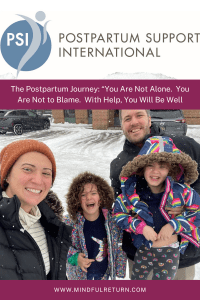
Mindful Return: Can someone get support from PSI while also juggling work, childcare, and the rest of life?
Absolutely! PSI offers free 90-minute support groups at various times both throughout the day and during evenings.
Individuals can apply for a free four-month peer mentorship program in which the individual is matched up with a mentor for connecting on a weekly basis or whatever works for their schedules.
Anyone unsure of where to find perinatal mental health resources in their area may simply fill out a confidential form online, to be connected with a PSI coordinator within 24 hours.
PSI also sponsors the world’s largest fundraising event to raise awareness around perinatal mental health called Climb out of the Darkness. Climbs take place across the country and globally. These events allow attendees a great opportunity to connect with other birthing parents and professionals who are passionate about raising awareness about perinatal mental health.
There are also a number of ways for people who have recovered from a PMAD to volunteer for PSI, which is a meaningful way to give back to this community.
Mindful Return: You now have a professional role within PSI. Can you tell us more about the work you do now?
My initial involvement with PSI started in March of 2020, when I began volunteering for PSI’s Peer Mentorship Program. I later became a Support Group Facilitator volunteer in Spring 2022. Given my professional background in facilitating education and training sessions to various constituencies in the non-profit sector, and my incredible personal experience with the organization when healing, I knew that once I was ready to re-enter the workforce, my dream job was to work for PSI. I feel so passionately about PSI’s work and mission and feel incredibly humbled and lucky to be a small part of the PSI family.
I currently serve as PSI’s Chapters Program Coordinator. Along with my fabulous colleague, Jenn Davis, we help support domestic PSI Chapter Boards in virtually every state across the country. The Chapters program was developed to further the mission of PSI across the United States, and we are delighted that chapters are also starting to emerge abroad, as well. Every state, or region, has its own respective opportunities, barriers, and access to information, education, and resources surrounding perinatal mental health. Our goal in creating and supporting chapter boards is to gather stakeholders – ranging from mental health care providers, to PMAD survivors, to birth fathers, to other community members of any background committed to raising awareness around perinatal mental health. Gathering these diverse constituencies has, in turn, provided a platform for PSI Chapter Board leaders to identify areas of need in their region and to create strategic priorities to address them.
Mindful Return: What are the benefits of having a state PSI chapter, and what states (and territories) would you like to see form one?
While each has its own localized preferences and priorities, to some extent, all are beneficial to their members and communities in a variety of ways. For example, chapters may:
- work to raise awareness and bring in PSI trainings to providers in their areas;
- offer scholarship monies towards PSI trainings or Certifications in Perinatal Mental Health (PMH-C);
- provide PMAD educational materials to hospitals;
- serve as content and thought leaders in crafting and promoting legislation in their states;
- advocating for RN and OBYNs to obtain required professional development hours in perinatal mental health;
- become prominent figures on maternal mental health task forces;
- promote awareness campaigns;
- fundraise for chapter programming; and
- raise grant monies to support full-time staff and create local programming
Having a connection and access to the resources and fiscal sponsorship of PSI International is a huge benefit for Chapter Boards, too. Another meaningful benefit for State Chapters is the ability to connect with other Chapter Boards around the country to bounce ideas off of and learn from each other. PSI also has relationships with the Maternal Mental Health Leadership Alliance (MMHLA), 2020 Mom, March of Dimes, and a number of other sister organizations with whom we encourage relationships and partnerships whenever opportunities arise.
I am pleased to say that almost every state – 47 states in total – now currently has a PSI Chapter Board! In more good news, we expect Hawaii to join the ranks this year and efforts are underway to start boards in West Virginia and Rhode Island, as well.
In addition, we are also looking forward to adding Washington, D.C. and Puerto Rico into the Chapters family soon. And we would love to see PSI Chapter Boards represented in all U.S. territories in the future. I welcome anyone who is interested in starting or participating on a board, or who would like to be connected to the already existing boards, to reach out to us at mberg@postpartum.net.
Truly, the only limit to what these Chapters can accomplish is the ambitions of their members. There have already been countless times where, after seeing what various boards are accomplishing, I have thought to myself, “Wow! I wish I had had that resource when I was going through a PMAD.” I cannot wait to see what our chapters will accomplish this year!
Mindful Return: As you may know, Mindful Return now has international chapters, so our community now consists of working parents all over the globe. Can you tell us about PSI’s global reach?
PSI’s expanding international footprint currently reaches over 40 countries through our International Support Coordinators and local support groups. You can find the full list here. We have a number of help-seekers from Spanish speaking countries that can reach out to our Spanish speaking helpline and access other resources in Spanish.
Additionally, “Climb Out of the Darkness” events happen all across the globe. In 2022, for instance, climbs were held in Kenya, Greece, Indonesia and Australia. One of our top priorities for 2023 is to ramp up our International Affiliates program (the counterpart to our U.S. Chapters program).
Mindful Return: At Mindful Return, we work with many employers who are working to support their new parents through the transition back to work after parental leave. What do you wish employers knew about PSI? And is there any way for them to seek out, engage with, or spread the word about PSI’s resources?
In the same way that we would love any health care provider to extend information about PSI to their patients, we would love for employers to know about the services that we provide and include educational materials to employees. Additionally, we would encourage employers to highlight the support and resources that PSI does offer, in case they have employees who are struggling with perinatal mental health disorders. These include support groups, peer mentors and our directory of trained providers.
Candidly, PSI’s historical focus has been to offer direct services to help seekers in addition to having a goal to reach physicians, midwives, doulas, lactation consultants – mostly medical professionals that come into the life of a new family. We consider ourselves a bridge between help seekers and trained providers. That being said, Chapter Boards have been working on furthering their reach beyond the medical community. And this liaising with employers sounds like an excellent opportunity that PSI Chapter Boards should certainly explore.
Mindful Return: What advice would you give to a new parent who isn’t sure whether PSI might be a helpful resource for them?
As mentioned above, PMADs are much more common than we as a society openly discuss. It is my hope that knowing about PSI and its resources, at a minimum, can help end the stigma around perinatal mental health.
 I personally experienced uncertainty about whether PSI would be good for me shortly after having our second daughter. But I cannot overstate the positive impact those peer support meetings had on helping me climb out of the darkness and get to a point where I can now help others.
I personally experienced uncertainty about whether PSI would be good for me shortly after having our second daughter. But I cannot overstate the positive impact those peer support meetings had on helping me climb out of the darkness and get to a point where I can now help others.
The variety of resources PSI offers is geared toward introverts and extroverts alike, and the fact that these resources are free for interested individuals means you have nothing to lose. Even if you conclude that PSI’s resources will not directly benefit you, we all know others in our lives who could benefit from them. In some cases, these resources may even help save lives.
I will end with PSI’s universal message: You are not alone. You are not to blame. With help, you will be well.
Want more practical tips on working parenthood? Check out my book, Back to Work After Baby: How to Plan and Navigate a Mindful Return from Maternity Leave

